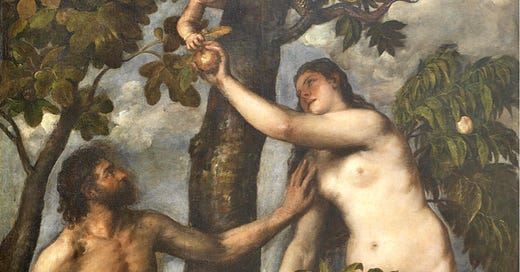Adam was history’s first snitch
When confronted after eating the forbidden fruit, Adam’s approach wasn’t exactly stoic. He pointed fingers. Also, is God a nudist?
In the Beginning, there was Adam and Eve and the Garden of Eden, a utopia that came with only one condition: Don’t eat from that tree over there, the tree of the knowledge of good and evil.
There’s a lot of meat in those first three chapters of Genesis, before Cain and Abel arrive. The next several stories will explore Genesis from multiple angles.
But what’s of interest today is a point I rarely see made. After eating from the tree he was told not to, Adam didn’t own up to what he had done. He pointed fingers.
Adam, the mythical first man, was also the world’s first snitch.
A tattletale tells on other people; they’re the neighbor who calls the cops. Snitches give up the people they did the dirt with. Adam was a snitch.
Genesis 3:8 offers a rare depiction of God in human form.
Not “working through” people like Noah or King David, but “walking in the garden in the cool of the day.”
God senses something is wrong when he sees Adam and the as-yet-unnamed Eve in fig leaves. Why aren’t they nude? What do they know, and how did they learn it?
This reads like God is the owner of a nudist colony who was bummed out to see his patrons clothed and ashamed. Was nudism the endgame of the Garden of Eden?
In Genesis 3:11 God asks: “Who told you that you were naked? Have you eaten from the tree that I commanded you not to eat from?”
Adam responds, in Genesis 3:12: “The woman you put here with me — she gave me some fruit from the tree, and I ate it.”
In one sentence, Adam became the world’s first snitch, blaming both his helpmate and the God who created her.
Never does he admit responsibility. He doesn’t say “I was curious,” or “it looked tasty,” and ask forgiveness. He tries to duck responsibility by pointing fingers. This is bad form, bad leadership, and bad manhood.
Remember, it was Adam who God delivered the instruction to, personally, in Genesis 2:16-17. Eve hadn’t even been crafted from Adam’s rib yet. That comes in Genesis 2:21.
Yet when the serpent confronts the woman, and asks what God has made off-limits, Eve already knows the consequences of eating from the tree, and can recite them.
She’s been briefed. So much so that while God told Adam he would “surely die” if he ate from the tree, Eve believes she can’t even touch the tree without dying.
Yet she does touch it, and did eat from it, anyway. That’s a story for another day — why weren’t the first humans motivated by the promise of eternal life?
Adam had all the information he needed to avoid that tree and its fruits. He was warned. He was given an explanation. Nevertheless, he persisted.
How different does that story go if Adam apologizes and repents, like a King David would have? How it does end is with serpents being cursed to slither, women being cursed to give painful childbirth, and man sentenced to “painful toil…all the days of your life.”
Feels like an apology might’ve been worth a try.
Genesis 3:6 indicates Adam was with Eve the entire time she spoke to the serpent.
She recited the warning she was given, but had to think it strange that Adam, who’d been told all of this by God directly, sat by and said nothing, and ate as if he’d been told nothing. Not the behavior of someone who will “surely die.”
Adam wasn’t misled. Adam failed to lead.
Adam didn’t speak up in the moment of truth, but pointed fingers in the moment of blame. This is putrid.
Between this and his record as a parent, with — his son, Cain, committed the Bible’s first homicide, in killing brother Abel — Adam is one of many characters in the Bible whose value is teaching us what not to do.




